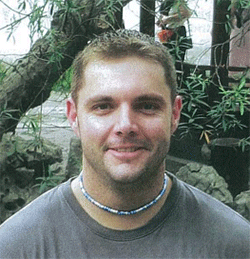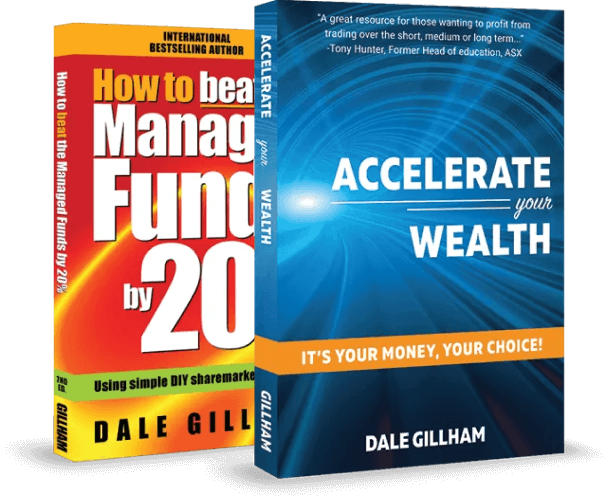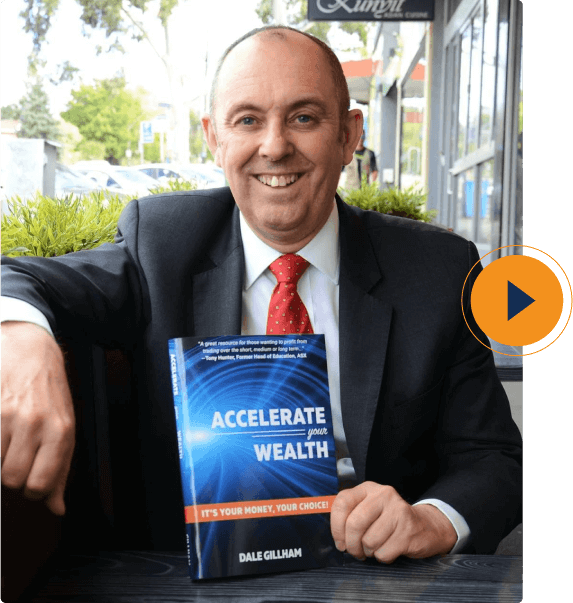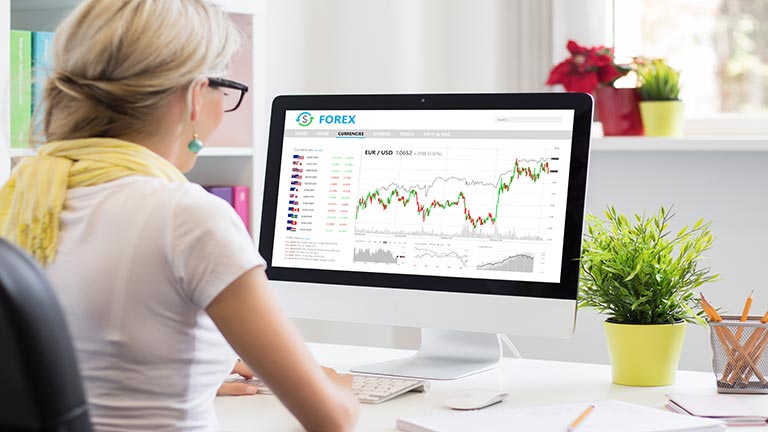Wealth Within Case Studies
Glenn Manning
Glenn lives and trades from his home in Queanbeyan (near Canberra) in New South Wales, Australia. For most of his professional life Glenn was an IT consultant, operating his business as a sole trader working both in Australia and overseas. In 2005, at the age of 28, a car accident left Glenn a quadriplegic, and put an end to his IT career and business. Glenn’s trading journey began in earnest following his accident. From the need to find a career he could still participate in and enjoy, Glenn embarked on a period of intensive study and learning about the markets. He now trades consistently and profitably with a strict and well-researched trading plan.

How and when did you first become interested in the markets?
In 2000 I was working for Stockford Ltd, a finance management company in Melbourne. Over several months the company went on an aggressive acquisitions phase, in an effort to grow the company prior to a planned listing on the Australian Stock Exchange. Employees had the option to purchase stock at a discounted price before the IPO. I jumped at the opportunity and bought $5000 worth. At the same time I bought some shares in two other smaller companies on a ‘hot tip’ from a colleague.
And then what happened?
For about two years the stock market was in a great bull run and the price of my pre-IPO stock was some 500 per cent higher than when I purchased. I remember feeling on top of the world, and thinking that this was the easiest money I had every made and why hadn’t I done this sooner! However the feeling didn’t last much longer. The company had some financial difficulties in late 2002 and was placed in voluntary administration in early 2003. By the time I went to sell my shares (after being advised not to because the company would bounce back) they were in a trading halt. They stayed that way until they were finally delisted and I lost my $5,000.
In early 2006 I was in the spinal rehabilitation unit after my accident when I became friends with another guy there. We got to talking about trading and investing. He asked what areas would be good to invest in, and I suggested the market. I also stipulated that if my past experience had taught me anything it’s that you have to do your research, keep an eye on your trades and manage them well. We then decided we would both get into the market.
How have you been able to learn and educate yourself about the markets?
At first it was just talking to other people who were investing in the market; and I was also lucky enough to meet a few people who were actively trading. I would sit and talk with them for as long as they would let me, just getting as much information and knowledge as I could. At that stage most of the conversations would go straight over my head, because I didn’t yet understand the terminology, concepts or theories. I needed a more basic understanding, so the first book I read was “Share Investing for Dummies” by James Dunn. I think I must have read every piece of information about trading available on the Internet. That served only to confuse me even more, because everyone had a different opinion on what did and didn’t work.
After some costly initial mistakes I knew I needed to learn still more, so I enrolled in the Diploma of Share Trading and Investment offered by the Wealth Within Institute and then in the Forex and CFD Trading Course also from Wealth Within.
Did you make mistakes when first starting out?
The friend I had met in the spinal rehabilitation unit had purchased one of those wealth-creation home study kits, from one of the leading companies, and he lent it to me to have a look through. After going through the overview on options trading, I found some more information on the Internet about the strategies they use, basically outlining the whole process. After reading the 10-page document I thought I knew it all. I opened an online options account and started applying the system using one of the stocks they recommended, Newcrest Mining.
The first trade went well, making around $1,700. I thought I would do a few more contracts on the next trade, which went horribly wrong and I lost around $6,000. This was well before I had undertaken the two courses from Wealth Within and is, in fact the reason I decided to do the courses. I guess the biggest mistake I made when first starting out was thinking I knew everything and jumping in too soon without having enough knowledge.
Would you define yourself as a discretionary trader, a mechanical trader or a combination of both?
Now, after all the study I have completed, I am definitely a mechanical trader. I use a back tested trading plan for each stock, with a specific set of entry and exit rules as well as strict money management. Before my study I used to trade on gut feel, which obviously didn’t work out too well for me. Now what I try to do is eliminate the emotional aspect from my trading.
Who have been some of your mentors and role models? What impact have these people made on you personally as well as on your trading style?
My most significant role model is my father, who, thankfully, I got my patience and analytical thinking from. These two traits helped me excel in my last career and definitely help me with my trading. Unfortunately I don’t have a trading mentor as such though I am still looking. The person who has had the most influence on my trading would have to be Blake Sterling from Wealth Within, whose help and advice have been invaluable.
Can you give us a brief overview of your trading style?
I have a systematic and disciplined approach to my trading wherein I create several trading plans, each with different entry and exit rules (Dow, Gann and so on), stop loss and money management rules. I then back test each one of these plans on the stock I am thinking of trading, over a period of about eight years, to see which performs best. Then I fine tune it. After that I do time analysis on the stock to determine the cycles and what phase the stock is in currently.
Is there any one trade (win or loss) that sticks in your mind that had a profound effect on your development as a trader? If so, what did you learn from that trade?
This would have to be my first live trade on CFDs. I was trading ANZ long. I had conducted all my analysis and back testing and I had set all my money management rules. I placed my trade and over the course of the next few days I watched the overall market rise whilst the banking sector, including ANZ, fell. It hadn’t fallen to the level of my stop loss yet but I panicked and sold early, thinking I would get out now and save any extra loss. About a day after I sold, ANZ turned up again (before reaching my original stop loss level) and had a nice little run up for about three weeks. The trade would have given me a profit of around $4,000 had I stuck to my original and well-researched rules. The lesson I learnt from this is to always trust my analysis and not try to second guess the market.
Can you tell us about your best and worst and trades?
I think a CFD trade in Bradken Ltd would have to be my best trade so far. I bought in March ’09 for $1.85 and sold in October ’09 for $6.25. Ordinarily this would be a gain of just under 340 per cent, but considering they were CFDs and traded on leverage the gain was a bit more significant.
Thanks to what I have learnt from Wealth Within I no longer have any horror trades, because my money management rules get me out of losing trades early and at a predefined level. My worst trade would have to be a tie between the loss I took on Stockford Ltd and my second attempt at options on Newcrest Mining.
Would you classify yourself as a short-term or a long-term trader? What advice would you offer to people getting started as traders on the relative merits or otherwise of each?
I would have to classify myself as a medium-term trader, staying in a trade usually around one week to three months. This is mainly because I like to trade the CFD market, which has financing costs payable when holding long positions. That’s not to say that I won’t hold on to a stock a little longer if it’s performing well and it hasn’t yet hit my exit.
I think if you are going to trade the market, continually buying and selling stocks, then any time span is challenging – because theory and practice should be the same on any time span. However, if you are more of an investor in the market, then the long-term ‘buy and hold’ strategy might be more comfortable.
What markets do you trade and which do you prefer? Do you have a favourite, and why?
I like to trade CFDs on the Australian market but I also trade standard shares occasionally, since CFDs aren’t available for all stocks. I like trading CFDs because it enables me to trade both the up side and the down side (long and short). Using CFDs also gives me access to the higher-priced stocks without having a huge amount of capital tied up in these positions.
What makes your trading style different from others? What sets you apart from other traders?
I would like to think what sets me apart from others is the fact that I actually have trading plans and that I back test these trading plans extensively. I don’t know how many times I have read that many traders trade without a plan.
Do you have a favourite trading rule?
I actually have three favourite trading rules that I think are equally important. The first is to maintain strict money management rules; the second is to back test extensively; and the third is never to trade against the trend.
Ed Seykota says, “Everybody gets what they want from the markets.” What does Glenn Manning get from the markets?
I guess the market gives me the challenge I’m looking for now, since I can no longer continue with my career because of my disability. I think both the market and the two courses I have completed have given me the ability to escape mentally into something that is productive and limits the time I’ve had to dwell on the past.
How has trading affected your lifestyle?
One thing my accident has given me is a lot of time; apart from physiotherapy five times a week there is not much else I really have to do in a day. So I am luckier than most traders in that I can spend as much or as little time as I like trading.
What books, seminars and courses have you read or attended and which would you recommend?
To anyone who is really looking to trade the markets and learn proven principles and practices, I would have to recommend Wealth Within. Their courses really make you think and use what you have been taught throughout the whole process. The educational support is absolutely brilliant and they actually use the principles they teach to manage client money, so you know they must work.
I would recommend ‘Trading in the Zone’ by Mark Douglas as a ‘must read’ for the psychology side of trading.
What does the future hold for Glenn Manning?
I’m really hoping that there will be a cure for spinal cord injury, but until that day comes I will continue with my trading. I am planning to do some more courses and to get my financial planner’s licence. In the very near future I plan on starting a business with the close friend I made while in the spinal rehab unit. You can never be sure what the future holds, but it will always be something mind-blowing!
Insights From Our Learning Centre


Learn the concepts as to how you can accelerate your wealth using simple DIY investment strategies that will enable you to take control of your investments. Dale Gillham, bestselling author, shows you how to invest with confidence to achieve very profitable returns.
Browse BooksOr Browse By Topic
5 Stars
Years in business delivering high-quality education
of students rate the quality of education as excellent or very good
of students recommend Wealth Within



